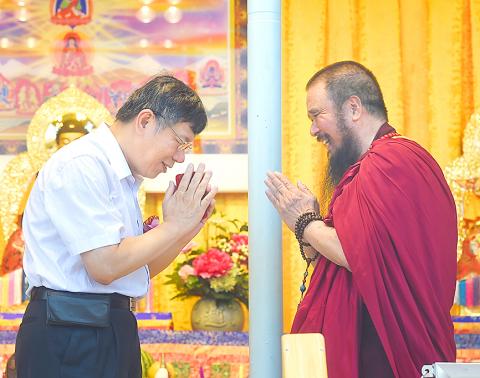The death penalty is supported by the majority of the public in Taiwan and is deeply rooted in Chinese culture, so there should be a mechanism to implement life imprisonment if the death penalty were to be abolished, Taipei Mayor Ko Wen-je (柯文哲) said at a religious event yesterday.
The execution of seven people on death row in Japan last week once again stirred up debate about capital punishment in Taiwan — and with several dismemberment cases that shocked the nation last month, politicians were asked about their thoughts on the death penalty.
“I like to study statistics and there is only one public issue in Taiwan that has overwhelming support from the public: More than 85 percent of the public is in favor of keeping the death penalty,” Ko said.

Photo: Fang Pin-chao, Taipei Times
The death penalty is part of Chinese history, and Emperor Gaozu of the Han Dynasty promised his subjects to put murderers to death when he overthrew the Qin Dynasty, Ko said.
Many countries have abolished the death penalty, especially EU member states, and they often urge Taiwan to follow, Ko said.
“There are cases in which people sentenced to life imprisonment are released about 10 years into their sentences,” which makes abolishing the death penalty more attractive, he said.
Ko was also asked to elaborate on a remark he made on Saturday about former president Lee Teng-hui (李登輝) having led Taiwan onto a path of democracy “with no way back,” which some suspected might mean that Lee had led Taiwan toward populism.
Lee’s greatest influence on Taiwan’s history is changing the nation’s character, Ko said.
US political theorist Francis Fukuyama in the 1990s claimed that liberal democracy represented the “end of history,” but the founding Singaporean prime minister Lee Kuan Yew (李光耀) argued for the political ideology of “Asian values,” Ko said.
After pondering about Taiwan’s democratic development, Ko said he discovered that it would be impossible for Taiwan to adopt “democracy with Asian values” like in Singapore, because Lee has changed the nation’s character.
As the path has been taken, Taiwan can only use liberal and free methods to solve the dilemmas facing its democracy, Ko said.

Trips for more than 100,000 international and domestic air travelers could be disrupted as China launches a military exercise around Taiwan today, Taiwan’s Civil Aviation Administration (CAA) said yesterday. The exercise could affect nearly 900 flights scheduled to enter the Taipei Flight Information Region (FIR) during the exercise window, it added. A notice issued by the Chinese Civil Aviation Administration showed there would be seven temporary zones around the Taiwan Strait which would be used for live-fire exercises, lasting from 8am to 6pm today. All aircraft are prohibited from entering during exercise, it says. Taipei FIR has 14 international air routes and

Taiwan lacks effective and cost-efficient armaments to intercept rockets, making the planned “T-Dome” interception system necessary, two experts said on Tuesday. The concerns were raised after China’s military fired two waves of rockets during live-fire drills around Taiwan on Tuesday, part of two-day exercises code-named “Justice Mission 2025.” The first wave involved 17 rockets launched at 9am from Pingtan in China’s Fujian Province, according to Lieutenant General Hsieh Jih-sheng (謝日升) of the Office of the Deputy Chief of the General Staff for Intelligence at the Ministry of National Defense. Those rockets landed 70 nautical miles (129.6km) northeast of Keelung without flying over Taiwan,

The Ministry of National Defense (MND) today released images of the military tracking China’s People's Liberation Army (PLA) movements during the latest round of Chinese drills around Taiwan. The PLA began "Justice Mission 2025" drills today, carrying out live-fire drills, simulated strikes on land and maritime targets, and exercises to blockade the nation's main ports. The exercises are to continue tomorrow, with the PLA announcing sea and air space restrictions for five zones around Taiwan for 10 hours starting from 8:30am. The ministry today released images showing a Chinese J-16 fighter jet tracked by a F-16V Block 20 jet and the

City buses in Taipei and New Taipei City, as well as the Taipei MRT, would on Saturday begin accepting QR code payments from five electronic payment providers, the Taipei Department of Transportation said yesterday. The new option would allow passengers to use the “transportation QR code” feature from EasyWallet, iPass Money, iCash Pay, Jkopay or PXPay Plus. Passengers should open their preferred electronic payment app, select the “transportation code” — not the regular payment code — unlock it, and scan the code at ticket readers or gates, General Planning Division Director-General Liu Kuo-chu (劉國著) said. People should move through the